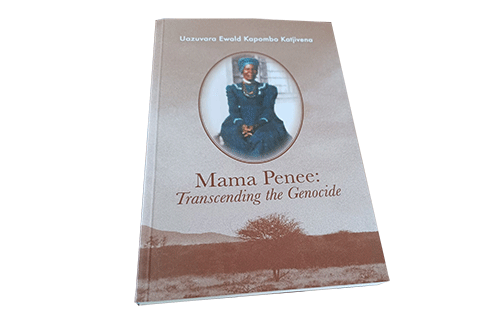Author: Uazuvara Ewald Kapombo Katjivena
Gerson Uaripi Tjihenuna
The book, ‘Mama Penee: Transcending the Genocide’, was published by the University of Namibia Press in 2020. It is a biography dedicated to the memory of Inaavinuise, the grandmother of the author.
Mama Penee, as she was popularly known, was a 1904-1908 genocide survivor.
In this book, the reader is introduced to Penee, an alert girl with an enquiring mind who could ‘recite the genealogy of her mother’s line’ (p.5). At the tender age of 10, she was taken through ‘…the maturity rituals, where she is given traditional headgear and garments to wear…’ (p.10).
The dramatic turn of events which changed the life of young Penee forever took place at Okavaka Mountains (Erongo region), which was her family’s temporary hiding place from German soldiers. As a birthday gift, “…. her parents gave her copper armbands as well as ozondao (threaded dried seeds) to be worn around her neck as a traditional necklace” (p.15).
Her joy was, however, short-lived as she watched helplessly as German soldiers shot both her parents dead in cold blood. “The German killers let out a cry of victory because they seemed to be happy with their actions” (p.16).
She stood there paralysed by shock “…as her parents lay dead at the feet of the Okavaka Mountains” (p.16). She started to “sleep-walk” in the direction of the German soldiers until one young German soldier waved her away with his cap; paradoxically as “a goodwill gesture”.
As she wandered around aimlessly for a few days in the wilderness, she came across vultures which were circling around as they were feeding on dead human skeletons; a cruel reminder of the fate that had befallen her own parents.
In her long journey, Penee ended up at Otjaheundu, now known as Khorixas. The reader is told that: “…the people of Khorixas were very kind to me, they took me to their chief, who took me in as his granddaughter” (p.25). By taking her in as his granddaughter, the chief was putting his own life at risk.
After reconnecting with her grand-uncle Katunu, Penee was eventually dumped on a farm where she was to work for a German woman, Frau (Mrs) Kirschner. Frau Kirschner forced her to take off her Ovaherero traditional attire in order to adopt the German Victorian style dress. However, the most humiliating part was when she “…. was forced to take off her headgear, which traditionally would have been removed only in a ceremonial act officiated by her parents or relatives. She moaned her tragedy in silence as the German woman also cut her headgear into pieces and put all the pieces in the fire. She felt terribly humiliated because that headgear was the last visible connection with her parents”
(p.33).
Although the Ovaherero ladies, like Penee, adopted the German Victorian style dress, they retained the traditional Ovaherero headgear as a symbol of “passive” cultural resistance.
Another very touching part of the book is when Penee decided to inflict pain on her own body in order to avoid rape at the hands of German men. “I made an oath that no German man would touch my
body. I walked into the veld until I found a lot of nettles, which I repeatedly rubbed on my arms and legs. The pain was excruciating, but I repeatedly burned my body until swelling started to show” (pp. 34-35). The German men, thinking that she had some incurable disease that was possibly contagious, stayed away from her.
Given that the author was writing about the painful experience of his grandmother, it is perhaps to be understood that there is an element of emotionalism and subjectivity in the book; and this is my only negative critique of the book.
However, the book is very educative and insightful, and it is a must-read for anyone who has an interest in the 1904-1908 genocide at the hands of the German colonial forces.



